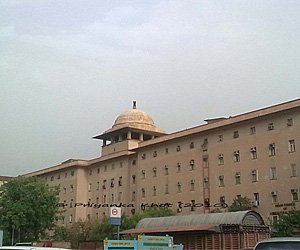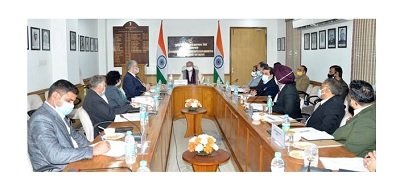India and Australia join hands to introduce fresh opportunities in Agriculture & Allied Sectors
Mr Philip Green, Australian High Commissioner calls on Secretary Dr. Devesh Chaturvedi at Krishi Bhawan New Delhi to explore platforms towards strengthening bilateral ties in agriculture and allied sectors
Mr. Philip Green, the Australian High Commissioner paid a courtesy visit to Dr. Devesh Chaturvedi, Secretary of the Department of Agriculture & Farmers’ Welfare at Krishi Bhawan in New Delhi . The meeting provided an important platform to further strengthen the bilateral relationship between India and Australia and to explore new opportunities for collaboration in the agriculture and allied sectors.
During the meeting, Dr. Chaturvedi underscored the significance of the longstanding and multifaceted partnership between India and Australia, with particular focus on the agricultural sector. He outlined India’s current priorities in agriculture, emphasizing that the government is not only committed to ensuring food security but also to enhancing farmers’ incomes and improving nutritional security for the population. Dr. Chaturvedi highlighted key initiatives such as crop diversification, the promotion of exports, achieving self-sufficiency in oilseeds and pulses, and the strengthening of Farmer Producer Organizations (FPOs) as vital components of India’s agricultural strategy. He also stressed the importance of technological advancements, including precision agriculture, the Digital Agriculture Mission, and the mechanization of small farms, in modernizing the sector. Additionally, he acknowledged the growing role of startups in driving innovation and transformation in agriculture.
Mr. Green, in turn, highlighted the importance of agriculture in Australia’s priorities and the potential for enhanced collaboration between the two nations. He expressed keen interest in exploring opportunities within the agritech sector and emphasized the importance of strengthening trade ties to further these objectives. Mr. Green stressed the need for continued engagement to identify and unlock new opportunities for trade and cooperation.
Both sides agreed on the importance of advancing collaboration across various areas, including agri-tech, horticulture, digital agriculture, and agricultural machinery.
Senior officials from the Ministry of Agriculture & Farmers’ Welfare, representatives from ICAR, and the Joint Secretary of the Ministry of External Affairs also participated in the discussion, contributing valuable insights and enriching the dialogue.
Mr Philip Green, Australian High Commissioner



